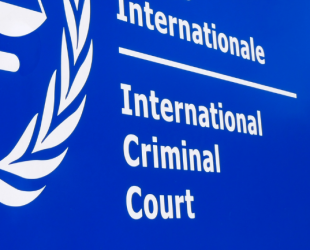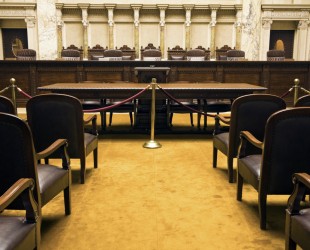Key Issue:International Criminal Court (ICC) and NGOs
On February 5, 2021, the International Criminal Court (ICC) announced that it has the jurisdiction to open an investigation into alleged war crimes committed by Israel in the “State of Palestine.” On March 3, 2021, the Chief Prosecutor of the ICC Fatou Bensouda announced the launch of a formal investigation. The investigation is to a significant degree the product of consistent and heavy lobbying of the ICC for over a decade by non-governmental organizations (NGOs). These include Human Rights Watch (HRW), Amnesty International, and a number of groups with ties to the Popular Front for the Liberation of Palestine (PFLP) terror group.
This section is excerpted from NGO Monitor’s Lawfare Monograph
Creation of the ICC
In 1995, three NGO superpowers, Human Rights Watch, Amnesty International, and International Federation of Human Rights (FIDH), alongside 22 other NGOs, formed the Coalition for the International Criminal Court (CICC). CICC played an integral role in establishing the ICC, as well as securing extensive NGO power within the ICC framework. Likewise (as discussed in “Which NGOs are Involved in Lobbying the ICC”) a number of these NGOs regularly contribute to the international demonization and delegitimization of Israel, including in the ICC context.
NGOs also played a crucial role at the June/July 1998 UN Preparatory Conference for the establishment of the ICC held in Rome ( “Rome Conference”). HRW’s, Amnesty’s, and FIDH’s UN consultative status enabled these organizations to participate in and make official statements at the conference. NGOs were deeply involved in creating a mechanism whereby ICC prosecutors could initiate their own proceedings. An expansion of this power would afford NGOs the opportunity to play a major role in the operations of the ICC, particularly through lobbying campaigns directed at the Prosecutor.
Since the beginning of Court operations in July 2002, NGOs have utilized the considerable authority granted to them in the ICC Statute. They have issued regular case updates and numerous reports promoting the ICC; they submit annual reports to the Assembly of State Parties, providing analysis and recommendations for the court’s operation; and they submit reports and case files to the Prosecutor. Given the NGOs’ lack of accountability and credibility, the significant clout granted to them at the ICC raises many issues. The NGO submissions regarding Israel involve highly flawed or invented legal arguments; deviation from the requirement limiting discussion to that of jurisdiction; revision and erasure of the historical record, including Palestinian terrorism; and promotion of biased source material.
Israel and the ICC
Although Israel is not a party to the ICC, since operations began in 2002, NGOs have lobbied intensively for a Security Council referral of Israel to the Court, and have submitted numerous reports to the ICC Prosecutor regarding alleged Israeli crimes. NGOs have also used official meetings of the ICC’s Assembly of State Parties to lobby against Israel.
Following the 2008 Gaza War, NGO interactions with the court greatly intensified. In January 2009, following the Palestinian Authority writing to the ICC Prosecutor attempting to join the Court, NGOs began an intensive campaign to pressure the Prosecutor to rule in favor of the PA. Amnesty International, Human Rights Watch, and others transmitted communications to the Prosecutor ostensibly documenting what they claimed to be Israeli “crimes” in Gaza. This attempt was rejected by the ICC Prosecutor in 2012.
In November 2012, the UN General Assembly allowed the Palestinian Authority to become a “non-member observer state” at the UN. In 2015, the ICC Prosecutor allowed the PA to join the Court. In December 2019, ICC Prosecutor Fatou Bensouda, supported by numerous anti-Israel NGOs, asked the Court to confirm her ability to open an investigation specifically against Israelis. A ruling is expected by June 2020.
Question of Jurisdiction
NGOs have sought to turn the ICC into a court of universal jurisdiction. The theory behind universal jurisdiction is that certain crimes are of “such exceptional gravity that they affect the fundamental interests of the international community as a whole.” National courts, therefore, are empowered, if not required, to prosecute the offenders. ICC jurisdiction is generally premised upon the principle of universal jurisdiction.
The exercise of universal jurisdiction is highly controversial because of its implications for state sovereignty and because jurisprudence “is disparate, disjointed, and poorly understood.” As a result, use of universal jurisdiction is “potentially beset by incoherence, confusion, and, at times, uneven justice.”
Despite these problems, many NGOs have lobbied for the adoption of a very expansive definition of universal jurisdiction without fully addressing the legal concerns. Many NGOs seek to extend universal jurisdiction to cover any “international” crime regardless of its international legal status and regardless of whether there is state consensus.
Like their exploitation of the UN and other international frameworks, these NGOs seek to use the ICC for demonization and to brand Israeli officials as “war criminals.” In contrast, the ICC was created for the explicit and narrow purpose of prosecuting individuals accused of specified crimes, and not for political legal warfare.







